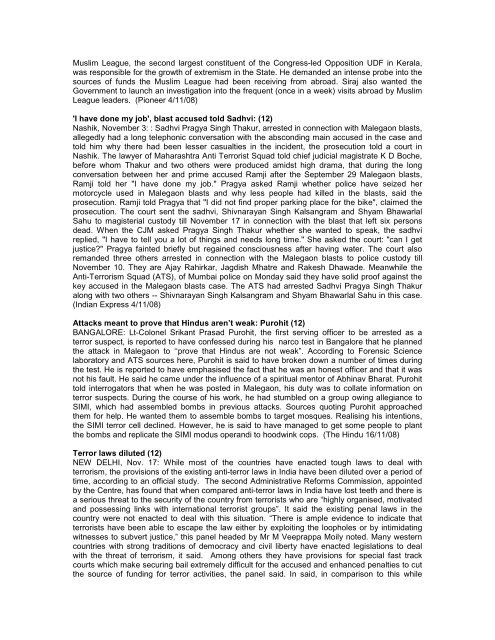TERRORISM - 2008 - Indian Social Institute
TERRORISM - 2008 - Indian Social Institute
TERRORISM - 2008 - Indian Social Institute
Create successful ePaper yourself
Turn your PDF publications into a flip-book with our unique Google optimized e-Paper software.
Muslim League, the second largest constituent of the Congress-led Opposition UDF in Kerala,<br />
was responsible for the growth of extremism in the State. He demanded an intense probe into the<br />
sources of funds the Muslim League had been receiving from abroad. Siraj also wanted the<br />
Government to launch an investigation into the frequent (once in a week) visits abroad by Muslim<br />
League leaders. (Pioneer 4/11/08)<br />
'I have done my job', blast accused told Sadhvi: (12)<br />
Nashik, November 3: : Sadhvi Pragya Singh Thakur, arrested in connection with Malegaon blasts,<br />
allegedly had a long telephonic conversation with the absconding main accused in the case and<br />
told him why there had been lesser casualties in the incident, the prosecution told a court in<br />
Nashik. The lawyer of Maharashtra Anti Terrorist Squad told chief judicial magistrate K D Boche,<br />
before whom Thakur and two others were produced amidst high drama, that during the long<br />
conversation between her and prime accused Ramji after the September 29 Malegaon blasts,<br />
Ramji told her "I have done my job." Pragya asked Ramji whether police have seized her<br />
motorcycle used in Malegaon blasts and why less people had killed in the blasts, said the<br />
prosecution. Ramji told Pragya that "I did not find proper parking place for the bike", claimed the<br />
prosecution. The court sent the sadhvi, Shivnarayan Singh Kalsangram and Shyam Bhawarlal<br />
Sahu to magisterial custody till November 17 in connection with the blast that left six persons<br />
dead. When the CJM asked Pragya Singh Thakur whether she wanted to speak, the sadhvi<br />
replied, "I have to tell you a lot of things and needs long time." She asked the court: "can I get<br />
justice" Pragya fainted briefly but regained consciousness after having water. The court also<br />
remanded three others arrested in connection with the Malegaon blasts to police custody till<br />
November 10. They are Ajay Rahirkar, Jagdish Mhatre and Rakesh Dhawade. Meanwhile the<br />
Anti-Terrorism Squad (ATS), of Mumbai police on Monday said they have solid proof against the<br />
key accused in the Malegaon blasts case. The ATS had arrested Sadhvi Pragya Singh Thakur<br />
along with two others -- Shivnarayan Singh Kalsangram and Shyam Bhawarlal Sahu in this case.<br />
(<strong>Indian</strong> Express 4/11/08)<br />
Attacks meant to prove that Hindus aren’t weak: Purohit (12)<br />
BANGALORE: Lt-Colonel Srikant Prasad Purohit, the first serving officer to be arrested as a<br />
terror suspect, is reported to have confessed during his narco test in Bangalore that he planned<br />
the attack in Malegaon to ‘‘prove that Hindus are not weak”. According to Forensic Science<br />
laboratory and ATS sources here, Purohit is said to have broken down a number of times during<br />
the test. He is reported to have emphasised the fact that he was an honest officer and that it was<br />
not his fault. He said he came under the influence of a spiritual mentor of Abhinav Bharat. Purohit<br />
told interrogators that when he was posted in Malegaon, his duty was to collate information on<br />
terror suspects. During the course of his work, he had stumbled on a group owing allegiance to<br />
SIMI, which had assembled bombs in previous attacks. Sources quoting Purohit approached<br />
them for help. He wanted them to assemble bombs to target mosques. Realising his intentions,<br />
the SIMI terror cell declined. However, he is said to have managed to get some people to plant<br />
the bombs and replicate the SIMI modus operandi to hoodwink cops. (The Hindu 16/11/08)<br />
Terror laws diluted (12)<br />
NEW DELHI, Nov. 17: While most of the countries have enacted tough laws to deal with<br />
terrorism, the provisions of the existing anti-terror laws in India have been diluted over a period of<br />
time, according to an official study. The second Administrative Reforms Commission, appointed<br />
by the Centre, has found that when compared anti-terror laws in India have lost teeth and there is<br />
a serious threat to the security of the country from terrorists who are “highly organised, motivated<br />
and possessing links with international terrorist groups”. It said the existing penal laws in the<br />
country were not enacted to deal with this situation. “There is ample evidence to indicate that<br />
terrorists have been able to escape the law either by exploiting the loopholes or by intimidating<br />
witnesses to subvert justice,” this panel headed by Mr M Veeprappa Moily noted. Many western<br />
countries with strong traditions of democracy and civil liberty have enacted legislations to deal<br />
with the threat of terrorism, it said. Among others they have provisions for special fast track<br />
courts which make securing bail extremely difficult for the accused and enhanced penalties to cut<br />
the source of funding for terror activities, the panel said. In said, in comparison to this while

















